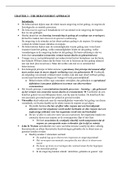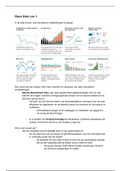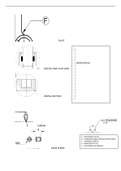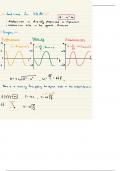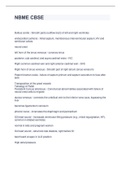Fundamenta problems / sulotions
2B 1. Would the results to the taxpayers in the Cesarini case be different if, instead of
discovering $4,467 in old currency the piano, they discovered that the piano, a Steinway, was the
first Steinway piano ever built and it is worth $500,000? Yes; Cesarini articulates the tax
consequences of finding a treasure trove: it is taxable in the year in which it is reduced to
undisputed possession. Here, the higher than expected value of the item purchase itself does not
constitute a treasure trove. Provided that this is an arms length transaction, TP would take a basis
in the item equal to the purchase price and then upon sale of the item TP would recognize a
capital gain.
2B 2. Winner attends the opening of a new department store. All persons attending are given free
raffle tickets for a watch worth $200. Disregarding any possible application of I.R.C. § 74, must
Winner include anything within gross income when she wins the watch in the raffle? Yes,
$200 gross income b/c when the watch crossed the barrier of ownership TP clearly realized a
$200 accession to wealth.
2B 3. Employee has worked for Employer's incorporated business for several years at a salary of
$80,000 per year. Another company is attempting to hire Employee but Employer persuades
Employee to agree to stay for at least two more years by giving Employee 2% of the company's
stock, which is worth $100,000, and by buying Employee's spouse a new car worth $30,000.
How much income does Employee realize from these transactions? The $100,000 worth of stock
results in $100,000 gross income to Employee because when the stock crosses the barrier of
ownership he clearly realizes a $100,000 accession to wealth. The $30,000 car also results in
$30,000 gross income to Employee. Even though the car is given to Wife, it is given by
Employer in compensation for Employee giving up HIS right to leave his job for another 2 years,
so it is gross income to Employee. Moreover, Employee is really in control of the disposition of
the car b/c he could have negotiated an alternative deal.
He also has $80,000 from his salary.
2B 4. Insurance Adjuster refers clients to an auto repair firm that give Adjuster a kickback of
10% of billings on all referrals.
(a) Does Adjuster have gross income? Yes
2B 4. Insurance Adjuster refers clients to an auto repair firm that give Adjuster a kickback of
10% of billings on all referrals.
(b) Even if the arrangement violates local law? Yes, illegal income is still gross income.
2B 5. Owner agrees to rent Tenant her lake house for the summer for $4,000.
(a) How much income does Owner realize if she agrees to charge only $1,000 if Tenant makes
$3,000 worth of improvements to the house?$4,000 gross income
$1,000 cash
$3,000 in improvements that were agreed to be a substitute for rent. § 109 does not apply here,
because the improvements were required as rent.
See IRC § 109
,"Gross Income DOES NOT INCLUDE INCOME (OTHER THAT RENT) derived by a lessor or
real property on the termination of a lease, representing the value of such property attributable to
BUILDINGS ERECTED OR OTHER IMPROVEMENTS MADE BY THE LESSEE.
2B 5. Owner agrees to rent Tenant her lake house for the summer for $4,000.
(b) Is there a difference in result to Owner in (a), above, if Tenant effects exactly the same
improvements but does all the labor himself and incurs a total cost of only $500? No, the fair
market value (FMV) of the improvements made is still $3,000 and it is still a substitute for cash
rent payments.
2B 5. Owner agrees to rent Tenant her lake house for the summer for $4,000.
(c) Are there any tax consequences to Tenant in part (b), above? Tenant has $3,000 in gross
income because he has been compensated $3,000 for making the improvement. He may have
only $2,500 income if can deduct the $500 in expenses.
*Treat as if tenant paid landlord $4,000 in rent, then landlord paid tenant $3,000 to make
improvements. PUT CASH IN THE MIDDLE.
Chapter 2 C
2C 1. Vegy grows vegetables in her garden. Does Vegy have gross income when:
(a) Vegy harvests her crop? No
2C 1. Vegy grows vegetables in her garden. Does Vegy have gross income when:
(b) Vegy and her family consume $100 worth of vegetables? No, imputed income is not
taxable.
2C 1. Vegy grows vegetables in her garden. Does Vegy have gross income when:
(c) Vegy sells vegetables for $100? Yes, $100 gross income
2C 1. Vegy grows vegetables in her garden. Does Vegy have gross income when:
(d) Vegy exchanges $100 worth of vegetables with Charlie for $100 worth of tuna which Charlie
caught? Yes, $100 gross income. Here, there is a transaction in which the vegetables and
tuna cross the barrier of ownership, thus we treat the transaction as if there was cash in the
middle and apply the FMV of the goods exchanged as income to each respective recipient party.
See Rev. Ruling 79-24: when payment is made in a form other than cash income is assessed
based on the FMV of the property or services taken in payment.
2C 2. Doctor needs to have his income tax return prepared. Lawyer would like a general physical
check up. Doctor would normally charge $200 for the physical and lawyer would normally
charge $200 for the income tax return preparation.
(a) What tax consequences to each if they simply swap services without any money changing
hands? Each will have $200 in GI. See Rev. Ruling 79-24: When payment is made in a form
other that cash, the amount of income is the FMV of services or property taken in payment.
2C 2. Doctor needs to have his income tax return prepared. Lawyer would like a general physical
check up. Doctor would normally charge $200 for the income tax return preparation.
(b) Does Lawyer realize any income when she fills out her own tax return?No, imputed income
is not taxable.
, 3B1 1. Our system of self-assessment requires the taxpayer to make the initial determination of
gift or income, and tax administration procedures give the Commissioner the power to challenge
that decision. If a judicial controversy develops, why is the decision of the trial court so
important, and what role may an appellate court play? The decision of the trial court is
important because determination of whether a transfer constitutes a gift is highly dependent on
the fact finder's (jury's or, in a bench trial, judge's) assessment of the transfer with respect to the
"donor's" intent. This case by case approach can yield wildly incongruous results depending on
how an individual fact finding body assesses an individual donor's intent, which is largely based
on self serving testimony that the fact finder assess for credibility/truth.
3B2 1. Employer gives all of her employees, except her son, a case of wine at Christmas, worth
$120. She gives Son, who also is an employee, a case of wine, worth $700. Does son have gross
income? Most likely yes, but it can be argued both ways. The most likely result is $120 of
gross income to son and a $580 gift from MOM.
IRC § 102(c) : an employee "shall not exclude from gross income any amount transferred by or
for an employer to, or for the benefit of, an employee."
Tres. Reg. § 1.102 - 1(f)(2): if the employee can show that the transfer was not made in
recognition then it will be considered a gift.
Here, all employees receive "gifts" written within the employer -employee context, & son
receives a similar "gift", albeit of a significantly higher value. It seems that the value should be
prorated so that son recognizes GI consistent with the value of "gifts" given to other employees
($120). The value of the "gift" above the standard "gift" given to the other employees ought to
constitute a tax-free gift because it was given in Employer's capacity as Mom, not as Employer,
Hence the excess value was motivated by "detached & disinterested generosity" "out of
affection, respect, or like impulses" making it excludable.
3B2 2. The congregation for whom Reverend serves as a minister gives her a check for $5,000
check on her retirement. Does Reverend have gross income? Most likely no GI.
This depends on the relationship between the proposed donor & donee. There does not seem to
be an employer-employee relationship between the congregation and the priest as there would be
such a relationship between the church as an entity & the priest. If the church, as priest employer,
gave him the $5,000 than it would be GI.
3B2 3. Retiree receives a $5,000 trip on his retirement. To pay for the cost of the trip, Employer
contributed $2,000, and fellow employees of Retiree contributed $3,000. Does Retiree have
gross income. $2000 GI; $3000 gift
The $2000 is a transfer from employee and does not qualify as a de minimus fringe benefit. The
$3000 is most likely a gift as it was not made by the employer, rather fellow employees, but the
recipient employee bears the burden of proving the disinterested motive of the gift if it is called
into question.
6B1 1. Owner purchases some land for $10,000 and later sells it for $16,000.
(a) Determine the amount of Owner's gain on the sale. $6,000 gain; owner has a $10,000
sale price less the $10,000 basis equals a $6,000 gain.
6B1 1. Owner purchases some land for $10,000 and later sells it for $16,000.
(b) What difference in result in (a), above, if Owner purchased the land by paying $1,000 for an
option to purchase the land for an additional $9,000 and subsequently exercised the option?


